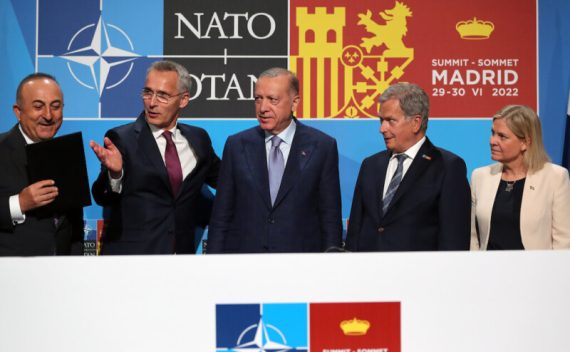S
weden has paid a heavy price in domestic politics for supporting terrorism for decades. Over the years, the country has become a safe haven for the PKK terrorist organization and other radical left-wing organizations targeting Turkey. In recent decades, the organizations have carried out, among others, their financial, political, and cultural activities on Swedish territory. By providing them legal and political protection, Sweden has helped such organizations stay in touch with the world. In this sense, their presence in Sweden has served as a protective shield for their activities elsewhere and granted them legitimacy.
Various groups in Sweden, which are directly or indirectly linked to the PKK terrorist entity, employ concepts respected by Western publics in order to enjoy the comfort of those countries’ diplomatic and political frameworks and engage in illegal activities. In this manner, they receive legal and political support to continue to exist within the local systems. In turn, the organizations and networks which have organized themselves in the guise of civil society on Swedish soil by utilizing Western-friendly concepts, and the immigrant ghettoes, which largely consist of political asylum seekers, have become a fertile ground for radicalization and all kinds of extremism.
In addition to the PKK, PYD, MLKP, and DHKP-C, groups like Daesh and the Al-Nusra Front have recruited dozens of members from the ghettoes. Although local intelligence services monitor such radical ghettoes very closely, the activities of such groups have been largely ignored as long as they did not commit any acts on European soil.
The Swedish authorities have disregarded repeated warnings and criticisms from countries that have been hurt by terrorism for long years, including Turkey. Swedish politicians, too, have exploited claims about human rights and free speech to clear the path for all forms of extremism – provided that they themselves did not suffer the consequences. Indeed, individuals linked to terrorist groups have even served as members of the Swedish parliament in an attempt to influence the country’s policies.
To some extent, Sweden’s indifferent attitude towards extremist views reflects the perspective of the Social Democrats, who have formed the backbone of Swedish politics for many years. Accordingly, various organizations and groups, which identify as radical left movements “fighting for freedom,” have operated under very favorable conditions during the Social Democratic rule. However, mainstream parties in many European countries, including the Social Democrats in Sweden, have been losing support in the face of radical right-wing parties. Indeed, the current government, led by the right-leaning prime minister Ulf Kristersson and his Moderate Party, enjoys the support of liberal and extreme right-wing parties. Whereas the Moderate Party and the extreme right-wing Swedish Democrats keep terrorist organizations at a greater distance, they are more receptive to Islamophobic and anti-immigrant approaches.
Sweden’s changing international standing
Hosting some of the world’s leading peace research and conflict resolution centers, Sweden also ranks highly among global arms manufacturers. The country has been ‘neutral’ in international politics since the nineteenth century, and with the exception of various peacekeeping operations, it successfully avoided being dragged into major wars. Whereas Sweden’s 1995 admission into the European Union and gradual efforts to link itself to the European security architecture have partly eroded its neutrality, its decision to join NATO represented a radical step for Sweden. Having stayed out of alliances for nearly two centuries, the country had already begun to change its approach under the influence of its EU membership. Nonetheless, NATO membership will represent a truly radical shift in the country’s policies.
In this sense, the NATO membership debate has been raging in Sweden, too. Although Sweden and Finland asked to join NATO at the same time, one could argue that the latter, which shares a 1,340-kilometer-long land border with Russia, has been more enthusiastic about joining the Alliance. Meanwhile in Sweden, the Social Democrats and some extreme right-wing parties, among others, remain divided over the issue. Still, NATO membership is particularly popular among young Swedes.
Sweden’s two centuries of so-called ‘hypocritical neutrality’ played a significant role in transforming it into an island of welfare. By remaining neutral within the international security architecture, the country was able to sell weapons and other industrial products to warring parties during major conflicts, allowing it to accumulate a significant amount of capital and welfare. Considering Sweden’s history, its attempt to join NATO represents an anomaly and faces heavy criticism from some Swedes, who believe that the new policy places their national interests at risk. Whereas the Russian invasion of Ukraine increased the number of advocates of NATO membership, it is important to underline that Sweden’s recent decision was radical and risky.
New security risks and the NATO membership debate
The decision to pursue NATO membership entailed serious risks for Sweden, whose new approach does not enjoy the support of the general public or all political players. After all, joining the Alliance would compel the country to reshape its national security policy based on a security concept determined by the United States. In this sense, Sweden’s security doctrine stands to become dependent on foreign governments. The newly formed alliance and the resulting risks would also likely impose certain demands on Sweden regarding armaments and military investments. Obviously, those terms would come with an economic and political price tag.
Turkey, which has been a NATO ally for more than seventy years, knows all too well that being part of the Alliance is not just about foreign policy and security. Upon joining NATO, alongside EU membership, Swedish politics will be exposed to a new parameter. NATO membership will reshape the country’s defense and security doctrines and there will be attempts to align the military stakeholders with the norms of transatlantic cooperation and security. Let us note that far-right parties, together with some Social Democrats, are unhappy with those new developments.
Sweden and Finland’s interest in joining NATO revived the debate in Turkey over their support for terrorist groups and military embargoes targeting the country. By now, the parliaments of all NATO allies, except Turkey and Hungary, have given the green light to their admission. Despite reiterating its support of NATO’s open door policy, Turkey has asked Sweden and Finland to take certain steps towards redefining their relationships with terrorist entities. Six months have passed since the three countries agreed on a road map at the NATO Summit in Madrid, yet the candidates are yet to fully implement all necessary measures.
Recommended
Meanwhile, some NATO allies, starting with the United States, criticize Turkey instead of mounting pressure on Sweden and Finland. Accordingly, there has been an increase in the number of articles and comments taking a jab at Turkey and advocating its removal from NATO, targeting President Recep Tayyip Erdoğan, and even arguing that Turkey must be kicked out of the Alliance because it is a Muslim country.
At the same time, supporters of the relevant terrorist organizations under official supervision continue to stage shameless protests targeting Turkey and its president. It is important to note that all the acts of aggression take place under state protection. Certainly, the most unacceptable of the most recent attacks involved the burning of a copy of the Qur’an near the Turkish Embassy in Stockholm which not only targeted Turkey but also the sacred values of some two billion Muslims around the world. It is no secret that Rasmus Paludan, the Danish provocateur that carried out the attack, received support from certain circles. However, he is a mere pawn, and it is necessary to concentrate on those pulling his strings.
The road map to prevent Swedish support for terrorism to which the three countries agreed on in Madrid is crystal clear. At this time, Sweden needs to abide by it and take all necessary steps. Attempts to falsely portray the attacks as anti-Turkish and anti-Erdoğan, as opposed to anti-Islam, don’t convince anyone and undermine Swedish officials. The Swedish authorities need to live up to their responsibilities instead of distorting the debate. At the same time, the Alliance’s senior leadership, starting with U.S. and NATO officials, should pressure Sweden instead of Turkey.
Taking stock of the current situation from a fair perspective, it would be more realistic to say that the problem is rooted in the confusion the Swedish society and politicians have about Turkey’s security – as opposed to Turkey’s reservations. Right now, Sweden attempts to divert attention away from its failure to uphold its commitments by targeting Turkey, President Erdoğan, and Islam’s sacred values. Those steps and approaches, however, only serve to deepen the crisis of confidence between Sweden and its potential allies.
Instead of instrumentalizing anti-Turkish and anti-Islam sentiments, Swedish society and Swedish politicians must face their Madrid commitments without further delay. Turkey and President Erdoğan are likely to face greater pressure during this process as Sweden refuses to comply with the NATO member’s legitimate security demands. In this sense, it would be more reasonable to make a distinction between Finland, which took steps in line with the Madrid memorandum, and Sweden, which did not comply with it.
Certainly, Washington and Brussels, which have been pressuring Ankara, would be disappointed by this approach as they are trying to ensure that Sweden and Finland are treated like two parts of a whole. Indeed, Turkey stands to experience greater tensions with Washington and Brussels if it were to come under additional pressure over Sweden’s NATO membership. On that front, it is necessary for the abovementioned players, at the very least, to take certain steps to alleviate Turkish concerns over terrorism and security. However, they are unlikely to make any moves that could potentially play into President Erdoğan’s hand ahead of Turkey’s upcoming elections.





